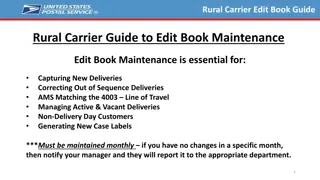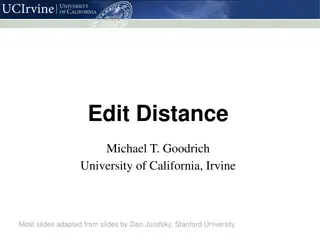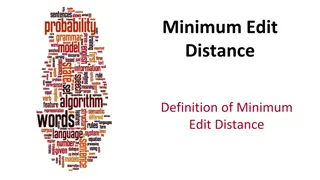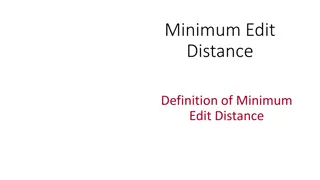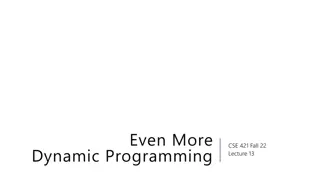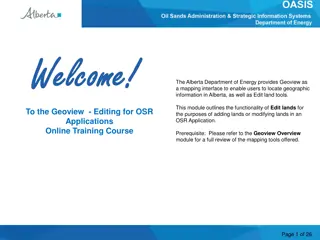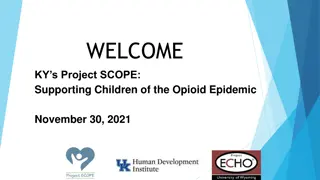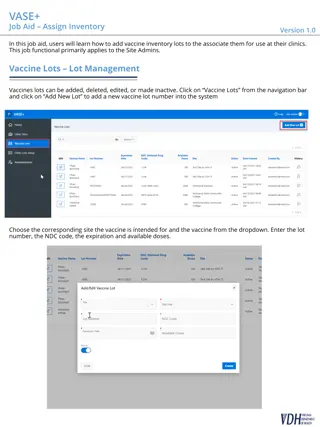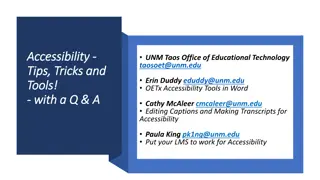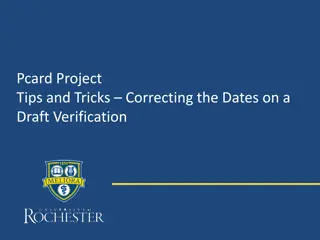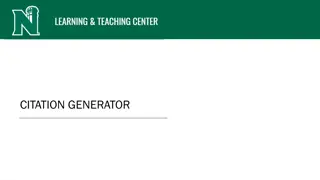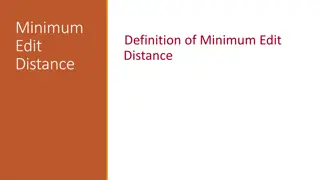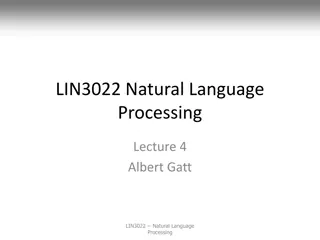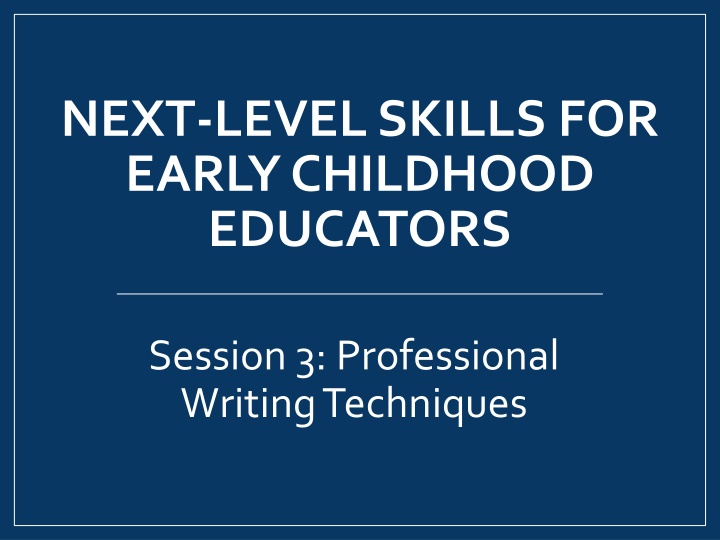
Enhancing Professional Writing Skills for Early Childhood Educators
Explore professional writing techniques for early childhood educators, including audience considerations, communication strategies, and tips for writing for different groups such as children, co-workers, parents, and the professional community.
Download Presentation

Please find below an Image/Link to download the presentation.
The content on the website is provided AS IS for your information and personal use only. It may not be sold, licensed, or shared on other websites without obtaining consent from the author. If you encounter any issues during the download, it is possible that the publisher has removed the file from their server.
You are allowed to download the files provided on this website for personal or commercial use, subject to the condition that they are used lawfully. All files are the property of their respective owners.
The content on the website is provided AS IS for your information and personal use only. It may not be sold, licensed, or shared on other websites without obtaining consent from the author.
E N D
Presentation Transcript
NEXT-LEVEL SKILLS FOR EARLY CHILDHOOD EDUCATORS Session 3: Professional Writing Techniques
Discussion What kinds of writing do you do in your profession? What are purposes for your writing? What does it mean to be professional in your writing?
Professionalism in your Writing Who your audience is determines: Formatting and style Tone of the piece- formal or informal The amount of technical language or jargon used The amount of information you assume the audience already knows Attitude
Communicating with Different Audiences Make your messages more clear by choosing the right words Use graphics and layout to make your written materials easier to read How can you communicate with parents with low literacy, have English as a second language, who are busy?
Writing for Children Spell correctly Keep in mind that you are modelling for children as well as teaching Always use positive tone Use proper grammar Use colour, pictures, style to reflect content as appropriate to age group
Writing for Co-workers Log entries, emails, updates Keep the tone positive and professional Can be semi-formal Co-worker may have information about the situation already Can use technical jargon
Writing for Parents Professional email habits Emails, flyers sent home, notifications Professional email habits Semi-formal but professional Limit use of technical jargon, use straightforward everyday language Always present information in a positive manner
Writing for the Professional Community Use technical jargon as appropriate Use formal tone in appropriate format- report writing etc. Keep the attitude positive, use objective observation High level of vocabulary Audience is very knowledgeable
Activity Divide into groups of 2 or 3 and look at samples of the kinds of writing you do on the job Fill out sample documents using the appropriate tone, vocabulary, and jargon for the audience
Spelling and Vocabulary Famous people who have difficulty with spelling: https://www.mentalfloss.com/article/51224/11- historical-figures-who-were-really-bad-spelling https://www.readandspell.com/famous-people-with- dyslexia
Tools for Spelling Words that are often misspelled: https://grammar.yourdictionary.com/spelling-and- word-lists/misspelled.html Words frequently used in the ECE field: https://www.uoguelph.ca/childcare/sites/uoguelph.ca.childcare/ files/public/documents/ELECT%20Information%20Booklet.pdf (see page 85)
Grammar and Writing Basics Capital letters https://www.grammarly.com/blog/capitalization-rules/ Plurals and possessives https://www.uc.utoronto.ca/sites/default/files/uploads/ plurals-and-possessives.pdf Pronoun agreement http://www.chompchomp.com/terms/pronounagreem ent.htm Verb tenses and forms https://www.perfect-english- grammar.com/verb-tenses.html
Grammar and Writing Basics Subject-verb agreement https://www.grammarbook.com/grammar/subjectVerb Agree.asp Complete sentences http://www.chompchomp.com/terms/completesentenc e.htm Run-ons, comma splices and fragments http://www.chompchomp. com/rules.htm Sentence variety
Structure and Organization Hamburger model of a paragraph https://www.australiancurriculu mlessons.com.au/2015/07/25/the -good-hamburger-a-writing- lesson-on-creating-paragraphs/ Web organizer (shown here) Review relevance, order and coherence of ideas, then organize and write
Structure and Organization Emails- Structure of emails https://www.thebalancecareers.com/how-to-write-and- send-professional-email-messages-2061892 Observation and Documentation https://www.uoguelph.ca/childc are/sites/uoguelph.ca.childcare/ files/public/documents/ELECT% 20Information%20Booklet.pdf (See page 80) ECEs have many responsibilities that involve writing
Journal Reflection Do I show professionalism in my writing? What does that mean to me? How can I improve my writing skills when writing for children, for co-workers, for parents, for other professionals in the field? What do I need to work on first? What resources can I access to help me improve?
Acknowledgements: This presentation was designed in 2019 to support Ontario s Early Childhood Educators in further developing the unique communication skills required in their role. It should be used with the accompanying Participant Workbook, and Reflection Journal. Curriculum developed by: Carolyn Little and Helen Krygsman Editing and design support by: Summer Burton Support for this project was provided by: Organizations are encouraged to copy and use these materials; however, reproducing or reselling these materials for profit is prohibited. If you have questions about this curriculum, we invite you to contact Literacy Link South Central at 519-681-7307 or literacylink@llsc.on.ca
Sources Capitalization. (2017, April 07). Retrieved from https://www.grammarly.com/blog/capitalization-rule Doyle, A. (n.d.). Tips on How to Write and Send Professional Email Messages. Retrieved from https://www.thebalancecareers.com/how-to-write-and-send- professional-email-messages-2061892 Early Learning for Every Child Today A framework for Ontario early childhood settings. (n.d.). Retrieved from http://www.edu.gov.on.ca/childcare/oelf/continuum/continuum.pdf Famous people with dyslexia | Read and Spell Blog. (2019, February 01). Retrieved from https://www.readandspell.com/famous-people-with-dyslexia (n.d.). (n.d.). Gillett, R. (2017, February 21). 21 unprofessional email habits that make everyone hate you. Retrieved from https://www.businessinsider.com/unprofessional-email-habits-2017-2 Government of Ontario. (n.d.). Observation. Retrieved from http://www.edu.gov.on.ca/childcare/oelf/observation/observation/index.html Simmons, R. L. (n.d.). Pronoun Agreement. Retrieved from http://www.chompchomp.com/terms/pronounagreement.htm Simmons, R. L. (n.d.). The Complete Sentence. Retrieved from http://www.chompchomp.com/terms/completesentence.htm
Sources Simmons, R. L. (n.d.). Rules. Retrieved from http://www.chompchomp.com/rules.htm Subject-Verb Agreement. (n.d.). Retrieved from https://www.grammarbook.com/grammar/subjectVerbAgree.asp Subject-Verb Agreement. (n.d.). Retrieved from https://www.grammarbook.com/grammar/subjectVerbAgree.asp The Good Hamburger - A Writing Lesson on Creating Paragraphs. (2015, July 25). Retrieved from https://www.australiancurriculumlessons.com.au/2015/07/25/the-good- hamburger-a-writing-lesson-on-creating-paragraphs/ Manis, C. (2012). Free Graphic Organizers for Planning and Writing. Retrieved from https://www.dailyteachingtools.com/free-graphic-organizers- w.html#WebsForPreparing Writers, S. (2019, March 01). 15 Famous Thinkers Who Couldn't Spell - Online College Courses. Retrieved from http://www.onlinecollegecourses.com/2012/01/24/15-famous-thinkers-who- couldnt-spell/ YourDictionary. (2018, August 23). 100 Most Often Mispelled Misspelled Words in English. Retrieved from https://grammar.yourdictionary.com/spelling-and-word- lists/misspelled.html


